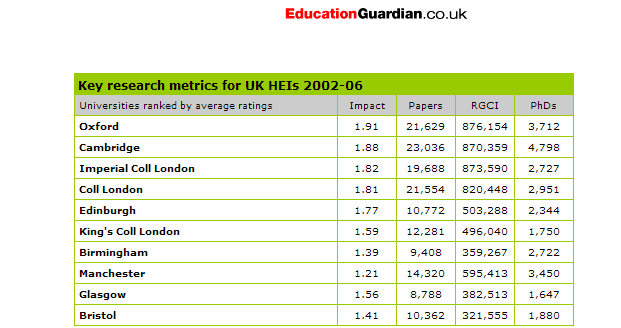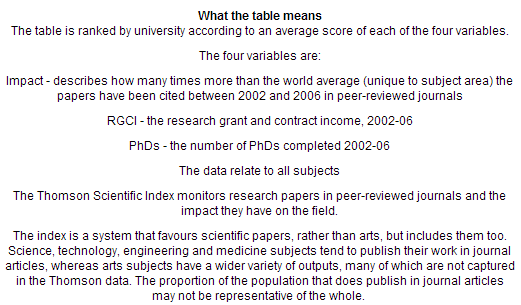|
News & Views item - October 2007 |
Deadline
for 2008 UK Research Assessment Exercise (RAE) Submissions Looms.
(October 31, 2007)
The deadline for submissions for Britain's 2008 Research Assessment Exercise (RAE) is November 30.
The Guardian's Anthea Lipsett reports: "According to a league table based on research impact, PhD numbers and income - which was drawn up by Evidence for EducationGuardian.co.uk - the frontrunners will remain the big research players, known as the 'golden diamond': Imperial and University College London, Oxbridge and Manchester universities."
But what comes after the 2008 assessment appears to be exercising the university sector more than the impending RAE.
This past June the UK's higher education minister Bill Rammell announced the intention of the government to replace the costly and labour intensive peer review methodology with a mainly metric based system.
Prior to this month's governmental pre-budget report, the Higher Education Funding Council for England (HEFCE), which manages the RAE on behalf of all the funding councils, reported to the government how it perceives metrics would work in practice.
By mid November the HEFCE expects to have in place consultations regarding its assessments.
Additionally,the UK's Vice-chancellors' group, Universities UK, intends to publish its report on metrics by the end of November.
It's worth noting that after over twenty years of trying to tweak the schema of the RAE its 2008 incarnation is still -- well corrupt.
Here is how Ms Lipsett describes matters:
In the meantime, the redesign of RAE 2008 to avoid much of the tactical "games playing" of previous rounds - such as leaving out early-career researchers and poaching other universities' academics to boost overall scores - appears not to have worked.
The new "quality profile", which will measure the different proportions of work in a submission that are judged to be 1*, 2*, 3* or the top 4*, was supposed to make assessment of research quality "fuller and fairer".
But universities have admitted to still excluding 1* research (quality that is recognised nationally in terms of originality, significance and rigour) and that of researchers still early in their careers.
Previous RAEs took place in 1986, 1989, 1992, 1996 and 2001.
The scoring system for RAE 2008 is a four-point quality scale, and will return:
a profile, rather than a single aggregate quality score, for each unit. The quality levelsóbased on assessment of research outputs, research environment and indicators of esteemóare defined as:
4* Quality that is world-leading in terms of originality, significance and rigour
3* Quality that is internationally excellent in terms of originality, significance and rigour but which nonetheless falls short of the highest standards of excellence
2* Quality that is recognised internationally in terms of originality, significance and rigour
1* Quality that is recognised nationally in terms of originality, significance and rigour
Eric Thomas vice-chancellor of the University of Bristol in a separate Guardian article makes the point that "there are four phases to a research assessment exercise (RAE): the submission, the assessment, the outcome and then the phase when the funding councils moderate that outcome to fit their policy objectives....[which] is the most important because it has the biggest effect on the funding formula... What this means is that the variables used to assess quality are less important than how the funding councils interpret them."
Whether or not that should fill you with confidence in the system would seem to be at the very least, problematical.
On the local scene so far the suggestions put forward by the Australian Labor Party for implementation of a Research Quality Framework (RQF) look more like shooting the universities with a smaller calibre gun compared to the Coalition's approach rather than helping the sector to become a first world force for the benefit of the nation.
The Guardian's university league table can be found at:
http://education.guardian.co.uk/higher/specialreport/tables/0,,2201298,00.html
Below is the listing of the top 10

